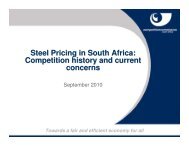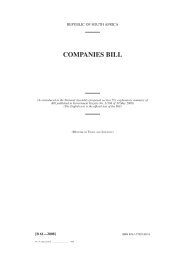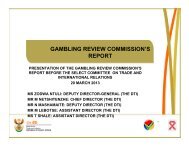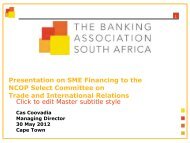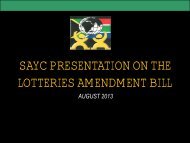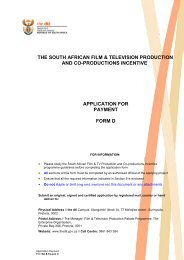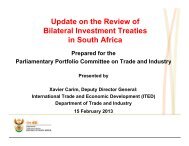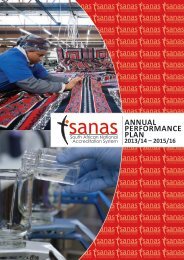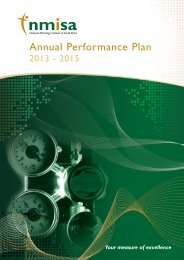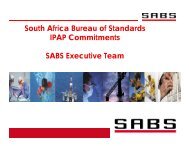Copyright Review Commission Report - ICT Law and Regulation ...
Copyright Review Commission Report - ICT Law and Regulation ...
Copyright Review Commission Report - ICT Law and Regulation ...
- No tags were found...
Create successful ePaper yourself
Turn your PDF publications into a flip-book with our unique Google optimized e-Paper software.
2.2 THE ESTABLISHMENT OF THE MUSIC INDUSTRY TASK TEAM (MITT)2.2.1. In 1995, the St<strong>and</strong>ing Advisory Committee acted as a commission of enquiry in terms of the <strong>Copyright</strong> Act,solicited public opinion on the reintroduction of needletime <strong>and</strong> recommended accordingly. This processculminated in legislative amendments to the <strong>Copyright</strong> Act <strong>and</strong> the Performers’ Protection Act, introduced inParliament in 2002 (report from the dti to the CRC on Government Involvement in the Music Industry, 2011).2.2.2. The renewed attempt to provide for needletime royalties took place in the context of the newly electedgovernment, supported by the poor majority, <strong>and</strong> consensus among all stakeholders on the need to improve thest<strong>and</strong>ard of living of performers who were entitled to a share (normally 50%) of needletime royalties. Thepoverty of musicians was evidenced by the recurring phenomenon of seemingly successful musicians dyingpoor (e.g. Simon ‘Mahlatini’ Nkabine). In 1998, this prompted the then Minister of Arts <strong>and</strong> Culture, Science <strong>and</strong>Technology to establish the Music Industry Task Team (MITT) to investigate the problems of the industry.2.2.3. The MITT met during February <strong>and</strong> March 2000 <strong>and</strong> held five regional hearings, from May to June 2000, inPietersburg, Bloemfontein, Durban, Cape Town <strong>and</strong> Port Elizabeth, deliberating with <strong>and</strong> consulting a widespectrum of South Africans.2.2.4. The MITT was part of a wider initiative of the Cultural Industries Growth Strategy (CIGS), which recognised theglobal movement towards an information or knowledge economy, a decline in the job-creation potential of thetraditional sectors of the economy, <strong>and</strong> the potential of South Africa’s culture sector to contribute to growth(Music Industry Task Team <strong>Report</strong>). The CIGS <strong>and</strong> MITT policy documents were developed as part of them<strong>and</strong>ate of the Department of Arts <strong>and</strong> Culture, Science <strong>and</strong> Technology to develop the music sector as acultural industry. CIGS advocated the development <strong>and</strong> promotion of the music sector as a tool for job- <strong>and</strong>wealth-creation. The MITT recommendations were aimed at the development of an effective <strong>and</strong> enablinglegislative framework, human resources, economic growth, <strong>and</strong> the development <strong>and</strong> promotion of the musicindustry.2.2.5. Based on submissions, the MITT identified the following problems in the industry: Inadequate <strong>and</strong> outdated copyright legislation, particularly with regard to needletime; Piracy <strong>and</strong> copyright infringement; Low levels of local content <strong>and</strong> lack of monitoring; Unfair contracts; Lack of access to education, training <strong>and</strong> information about the economics of the industry, <strong>and</strong> lack oftransparency <strong>and</strong> accountability of key players; Inadequate definition of musicians’ status as workers in labour legislation, undermining their access tolegal protection <strong>and</strong> benefits; Racism <strong>and</strong> sexism in the industry; Isolation of musicians living outside Gauteng; <strong>and</strong> Inadequate funding for music development.2.2.6. The MITT report made many valuable recommendations (see Appendix 3). Many of the problems mentioned inthat enquiry <strong>and</strong> addressed in the MITT recommendations are still prevalent in the music industry today <strong>and</strong>were raised repeatedly by stakeholders during the public hearings held by the CRC.- 11 -




